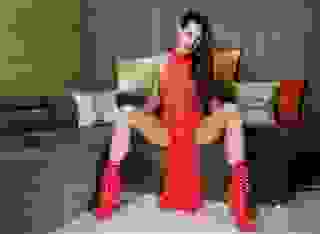- Romance
- Spring Green
- Page 4
Note: You can change font size, font face, and turn on dark mode by clicking the "A" icon tab in the Story Info Box.
You can temporarily switch back to a Classic Literotica® experience during our ongoing public Beta testing. Please consider leaving feedback on issues you experience or suggest improvements.
Click hereIt was the last time I ever saw him.
+++++
I took her call one day in April, not quite a year later. He was gone, Maddie told me, after a last brief struggle with his own wayward cells. Those cells had, I think, intended to impose change from within and Chuck simply wasn't going to have it. Rather than submit to their prevarications I imagined him just giving them the finger one more time, deciding it was time to move on and find something more productive to do with his time. What was Death to a man like him?
I thought about Uncle off and on during the flight from Nairobi to France. I thought about sailing to Bermuda and crossing the Atlantic even as Africa slipped by miles below, and the thought hit me: were all those journeys little more than metaphors? What did they represent to Chuck? To me?
And, what of me? I'd been working at State for too many years. I could quit now without feeling remorse. I was young enough to start a second career, yet old enough to realize that was out of the question. I had so much of my father's impulsive wanderlust thrown in with Uncle's resolute curiosity, all my father's antipathy for corporate nonsense and absolutely none of Chuck's will to dominate that world; any business sense I had came from monitoring economic developments in faltering banana republics. So what? That and a dime, right? I could remain at State simply by giving in to inertia; my life would pass comfortably and predictably into -- what? Memory? In truth, I had no one beside Maddie now; mother was falling into a fierce dementia and was beyond my physical ability to care for -- she hardly knew what planet she was on half the time. I had no wife, no children, no prospects at all along those lines. And I was tired. Tired of an encroaching sense of pointlessness that lurked behind everything I thought I might try to do.
So, yeah. Change my life, and yet I had, for all my life, failed to understand one basic element of change. Change all too often is spontaneous, messy, combustive and unplanned for. It happens. Shit happens. When you least expect it perhaps, and whether you want it to or not, Change -- like a leopard -- finds you unawares and springs for your throat.
You don't plan on that, do you? You can't just go out there and change, can you?
I arrived at Paris/Orly in the middle of a hazy afternoon in April, and I made my way pensively into the old city. Maddie and her current beau met me at the Crillon and we raised a quiet toast to Uncle, wished him a 'bon voyage' at dinner that evening, but in the end we were not sad.
I think we settled on the idea that is was inappropriate to be sad about a life so well-lived. We missed him, as I suppose we'll all be missed, one way or another, after we're gone. Still, I felt him in that evening, alive, watching over us. Maybe having a good laugh, too.
The three of us walked along the Seine, from the gardens all the way to the Ilse St Louis, then across the little bridge that carried us across to the little marina by the Bastille. I wanted to go there once again and see the boat nestled in her slip, find Chuck stripping that winch and re-greasing it. I wanted to hear him cuss in his own unique way, like when he barked his shin coming up the companionway ladder. A particularly hard blow would elicit an 'Oh, Fudge!' but more often than not you'd catch an errant 'Piffle!' -- or perhaps the ever deadly 'Fark!' might slip unawares from his lips. I remember him saying 'Shit!' only once, and when he turned and saw he'd been caught red-handed he turned red and then slunk off to hide somewhere. No kidding, he was that kind of guy. Anachronism doesn't even begin to cover what he was; he wasn't born in the wrong era -- I think he ended up on the wrong planet and was just as confused as any of us might be when he figured that one out.
But as with everything he else he did with his time, he made all our lives better just by being here.
Eventually he found an end to his journey in a small city southeast of Paris, a charming medieval university town with the singularly discordant name of Dole. The boat was there now, too; tied up and getting filthy -- I supposed. I could just see her gleaming teak now weathered and dull, bird crap an inch deep all over everything, and I wondered what to do about it.
So, you may now. if you'd like, think that it is of endings that I write, but I'd beg to differ with you. You might think our story had quite naturally found its way to an end, but in truth it was only just beginning. My understanding of Chuck was just beginning, and Maddie was as clueless as I.
Things are rarely as simple as they seem, at least not until you clear away the bird shit.
Change happens, I think I remember telling you some time back; and change happens whether you're ready for it -- or not. While change all too often marks an end to things, I was beyond any and all doubt unprepared for the beginnings that lay just ahead. No one was. There's no way you can prepare for an emotional holocaust, just as there is little you can do to prepare yourself for a miracle. I think I was clueless about love, real love, and would need to learn how to accept love when it came my way. Even if I was completely unprepared.
Part III
Thursday, 21 April 1987
My next journey with Maddie, and her new boyfriend Stephen, began a little after seven the next morning when an unlikely looking train of abbreviated proportions pulled out of the Bercy-Gare de Lyon bound for Dijon, then Dole, a trip of about four hours if all went well. The countryside seemed to be just waking from a hard winter's sleep, and yet just now we looked at pale traceries of spring's green budding were everywhere we looked.
Villages began their working day as amber sunlight slanted through puffy clouds onto lanes that meandered like gently bubbling streams deep within their sheltering valleys. Little farms nestled sleepily into rolling hills; tractors smoked and bounced, were poised to till rich black soil -- and so, yes, we looked out over a passage of renewal. As the little train creaked to stops in villages along the way, I looked at little snippets of the medieval world clinging to life in the late 20th-century, yet I thought about the contrasts between life here and the brutal existence that people clung to in equatorial Africa. Having now spend years in the region, I could see that life in much of Africa was much as it had been in medieval times, but people in the rural African villages I'd visited lived-on in that manner unknowingly, and usually, involuntarily. On this spring morning, when I looked out my window I saw villagers tending a usable past, stone walled sanctuaries where people manicured and watered their medievalism, nurtured and harvested their traditions. In some villages it was obvious this tradition was a cash crop, in others it looked like a cherished way of life -- and these people looked ready to fight to the death to preserve their past.
Chuck had, apparently, spent a good deal of time in Dole on his last journey. Maddie told me, as the train rumbled across that waking landscape, that Chuck had made a lasting impression with the people there. Chuck had never, however, mentioned anything to us about the people in Dole, or his experience of the place, and yet she'd talked to him only a few days before he passed. She had, however, told these people our itinerary. Someone would be, she had been assured, on hand to meet us, and take us to The Baby Ruth.
It was, then, with no small amount of curiosity in our hearts that we took-in waving banners with our names on them as our train pulled into the station. There was an official looking delegation waiting on the platform, these men and women flanked by a small band playing The Star Spangled Banner. We saw a few old men in uniform on the platform, soldiers and airmen mostly. As the train thudded to a stop I looked at Maddie and she looked at me -- and everyone on the platform was looking at us and pointing excitedly.
"Fark!" Maddie said slowly.
"Piffle!" I think I managed to say.
"What's going on?" friend Stephen howled. He looked put-out, almost scared, but then again he'd never met Chuck. He had no idea what a force of nature looked like. Now the truth of the matter was slowly dawning like this Spring Green blooming all around us: maybe Maddie and I hadn't known a helluva lot about Chuck, either, but his life was all around us now, in full bloom. I think I felt him smiling again, too.
I know I've mentioned more than once I really didn't know Uncle Chuck all that well, and nothing speaks to that better than how the whole Maddie episode caught me so completely unawares. And yet I was coming to understand that what I had learned about him over the years had been rendered through the fractured prism of my father's version of Chuck's life. But Maddie didn't even have that twisted compass to steer by -- who knows what was running through her mind as she took in this impossible sight.
We got our bags down from the overhead rack and walked out into the craziest day of our lives.
+++++
Saturday, 21 April 1945
The day began, like so many others had for Captain Charles W Addington, U S Army Air Corps, with an early morning pre-flight mission brief. An hour later he was flying in loose formation, his squadron's fighters high in the skies over eastern France. The day's mission: guard a formation of B-17s lumbering towards Bavaria. Addington flew a tired but well maintained P-51D Mustang, and while not perhaps the best pilot in his group, he was certainly competent. He had three recent 'kills' stenciled beneath his canopy, and had flown dozens of ground support missions since D-Day. Now, with German forces scattered and in disarray, Allied air forces were mopping up the last bits of infrastructure that supported the German war effort; today's B-17 raid was targeting ammunition caches in the mountains south of Munich.
It wasn't a large force of B-17s, just 18 of the droning bombers were ahead and below his formation, but there were still enemy aircraft coming up to meet the threat. German fighters, now mainly older Messerschmitt 109s flown by impossibly young pilots, were still managing to shoot down a -17 every now and then, so Addington's wing had been pulled from ground support and detailed to escort this morning's raid. They had departed an airfield near Paris just twenty minutes before his squadron met up with the bombers, and now he was scanning the skies for any threat to the bombers.
Someone shouted. Three fighters below, ten oclock! Another large formation at three oclock, high and diving for the bombers. Addington's section broke-off to take the three climbing from below, and he peeled away in a rolling left turn and -- inverted and smiling because he thought this stuff was above all else really fun -- he pulled back on the stick and dove down toward the threat.
The Messerschmitts saw Addington's section diving and broke off; the -109s dove toward the countryside far below; Addington pushed his throttle to the stops and continued in a steep diving pursuit. The Rolls-Royce Merlin roared with unrestrained fury now; his Mustang leapt past 400 knots and the Messerschmitts, without a significant height advantage, were soon in his sights. Then the three German aircraft broke formation and scattered; Addington took the lead aircraft and followed, lined up the Messerschmitt in his sights and fired.
He could see bits of the aircraft rip and flutter away in the slipstream, could smell raw fuel misting in the air he passed through, then orange fingers of flame licking the sky ahead. A small town lay just ahead, and he could see a group of three German Tiger tanks -- firing on the city -- and then he could see men on the ground defending the town as he roared over -- not a hundred feet below. Addington fired another burst at the German fighter, and the -109 burst into flames and fell beyond the outskirts of the little town; he pulled back viciously on the stick to climb over a wall of limestone cliffs suddenly just ahead, climbing through three thousand feet seconds later. Instead of climbing back to the B-17s, however, he rolled and reversed course, and dove back towards the German tanks.
He didn't have bombs -- but he did have six 12.7mm machine guns. He arced around the town in a sharp banking turn, looked off his left shoulder at the tanks below, saw a truck with anti-aircraft guns firing at him and pulled up sharply, then pushed the nose over and to the right. He continued his approach, decided to come in as low as possible, to use the hills and trees for cover. The mustang had literally tons of energy stored for the run; he climbed into a high banking turn then dove for the trees now five thousand feet below. He came over the last hill at well over four hundred knots and began firing at the Tigers and their support troops on the ground.
The tanks flashed by in a blur; Addington pulled back and climbed into a steep banking turn again, maneuvered to get in position for another run, this time from a different and, he hoped, a better angle. He looked at the scene below; one of the Tigers was in flames, troops were scattering in chaos.
He made his approach, decided to come in a little slower this run, came in right over the little town and began firing at the two remaining Tigers and the anti-aircraft truck. A second tank burst into flames, more troops fell; machine gun fire ripped through his right wing. Addington pulled back on the stick hard again, pissed off now and wanting some payback. The Mustang looped over and he leveled off in a steep dive -- right back down onto the remaining German armor. He emptied his guns on the tank, ran out of ammunition before he could hose off the anti-aircraft guns blazing away just yards from the last burning tank. More cannon-fire ripped into the Mustang; he broke off and turned away.
But his Mustang was vibrating oddly, and as he looked at the right wing he saw smoke and flames coming out the right side of the engine, then oil splattered back and blacked-out the windscreen and canopy. The Mustang lurched and shuddered; Addington released the canopy and let it fall away, the he rolled and -- now inverted and with his head pointed at the ground below -- he released his harness and fell away from the Mustang, fell towards the French countryside thousands of feet below.
He pulled the ripcord, his 'chute blossomed and jerked him upright and he settled into the yawing descent. He saw the town below, the river that ran through it, red tile roofs and narrow winding lanes. People were running, putting out fires and pulling the wounded from old stone houses that had just been shelled by the tanks. Something whizzed by his his face; he winced and turned, saw German troops across a field firing at him. About two hundred yards away, he thought; then a group of men who looked more like farmers and shopkeepers were firing at the Germans. He put his hand on his 45 as he drifted downward, reassured by the cold, steely presence under his flight-suit.
He looked down again; the town was coming up fast now, and he smiled in that moment -- because now he understood how a fly --through its many-faceted eyes -- might feel when it saw a flyswatter arcing-in for the kill.
Addington landed, if what he did might rightly be called a landing, on the steeply pitched roof of a four-story building; he tumbled downward among clattering roof tiles and scattering pigeons, vaulted off the roof at an odd angle, with his arms and legs flailing-away, as if trying to fly on his own, then he landed with a smacking-splash in a slime-filled canal lining the boundary of the town.
And he splashed into the canal in front of a girl who was at than moment washing her dying father's blood from her hands; water from Addington's splash mingled with tears on her face and she thought for all the world that tears from heaven had come to wash away her sorrow.
Then Chuck Addington sputtered to the surface a few feet in front of her, thrashing the water like a puppy on its first swim and yapping at least that much. She stumbled back against wall behind her and looked at the flailing man as she might an angel who had just fallen from heaven.
Captain Charles W Addington, U S Army Air Corps, spat slimy water from mouth and turned, saw a beautiful young girl staring at him in wide-eyed astonishment.
"Howdy-do, ma'am," Chuck Addington said matter-of-factly. He watched as the girl's eyes rolled back in her head and as her body crumpled like wet tissue and fell to the little tow-path along the water's edge.
"Fudge!" he said as he swam to the edge of the canal. He pulled a clump of mossy muck from his helmet, then tried with little success to crawl up the canal's slimy stone wall. He heard machine gun fire, felt the water erupt as a hail of bullets churned by his side. He turned in time to see a German soldier firing at him cut down, then a fat old man with a Tommy-gun ran into view and smiled, gave him a thumbs-up gesture before running off to join the fight raging on the south side of the town, leaving Chuck Addington clinging to the slippery sides of the canal -- like a wet cat. Two minutes before he had been safe in his Mustang -- and now this!
And to drown in a French sewer at the feet of a beautiful girl!
"Fark! Somebody?! Uh, anyone got a rope!"
Silence.
"Piffle!"
+++++
21 April 2005
We stepped off the train and onto the platform -- all was good-natured chaos, a carnival atmosphere prevailed. The little band, apparently prepared to play endless streams of rousing patriotic music, launched into 'When Johnny Comes Marching Home,' little American flags waved everywhere I looked. We had, I can safely say from the perspective of passing time, stepped into another world, and while it was a world I knew nothing about, there was something vaguely reassuring about the comically riotous atmosphere.
Had this response been generated by Chuck's coming to town a few months ago?
As the delegation approached my mind rebelled: 'Not possible! This is not possible!'
There followed a short speech by the Mayor, where Captain Addington's role in saving the village during the closing days of the war was recounted, and I listened mutely, tried to pick up every detail, every nuanced reference, because they were clues to this unfolding mystery. And everyone, it seemed, knew everything about us, about Maddie and I, and the whole thing was a little surreal. I remember feeling like a time-traveler I presumed might feel, or that this was what an altered state of reality felt like.
I heard a voice in the crowd say something about 'the day Captain Addington got shot down,' and my mind reeled. 'He -- what?!'
There had never been even one family story of Uncle Chuck getting shot down in the war, but maybe that's because I'd never heard any stories at all of Chuck as a pilot! None at all -- not ever, not even one oblique reference. Why? My dad mentioned once, I think, that Chuck went to Europe in the war's closing hours -- but, he said, nothing of consequence happened. Ooh-la-la! Remember I said my father's impressionist landscapes of his brother were at best questionable representations of the truth? If that was so, and if Chuck had been reluctant -- for whatever reason -- to dwell on the past, well, there you have it! Case closed! Yet one simple fact remained: as I stood watching and listening to the town's band and delegates I struggled to recall just one conversation with Chuck, and we're talking more than thirty years worth of idle chatter here, where either France or flying in the war came up. Why would he be so silent? Had he never told my father about any of this? Why not talk about it? There was no reason I could see, none at all.
Yet there had to be!








